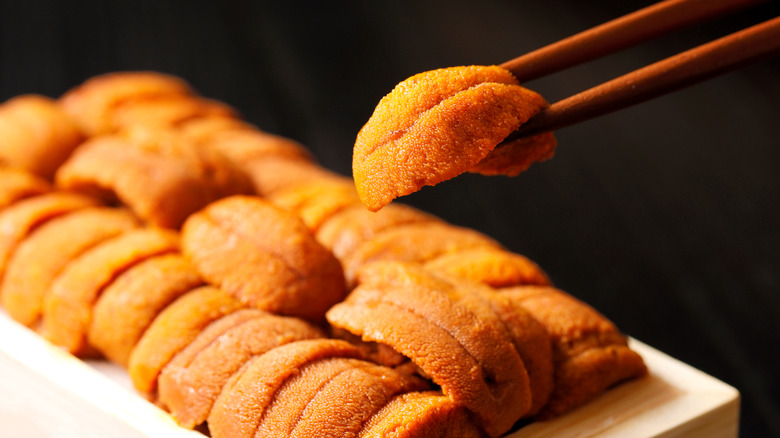The Offbeat Ingredient Gordon Ramsay Adds To Scrambled Eggs
Besides his culinary prowess, Chef Gordon Ramsay is primarily known for the entertaining, albeit abrasive personality that he showcases on television. Ramsay has been a regular on TV since 1996, when he served on the judge's panel of BBC's MasterChef (via Biography). They add that in 2005, Ramsay broke onto U.S. airwaves with Hell's Kitchen, a show of the same name that, just a year prior, was a huge hit in the U.K. Today, the accomplished chef and renowned restauranteur shares helpful cooking techniques on a wide variety of platforms, including his TikTok channel, that has more than 34 million followers.
Scrambled eggs are a popular breakfast choice, and according to YouGovAmerica, 36% of Americans prefer scrambled eggs over other methods, such as hard-boiled and over-easy. And Ramsay has found people are keen on these basic recipes, as one Youtube video of him demonstrating his scrambled eggs method has garnered over 12 million views. More recently, he's taken the scrambled eggs to new, unusual heights. For this more recent recipe, Ramsay incorporates a peculiar ingredient that isn't likely to be found in the refrigerators of most home cooks. This ingredient is a luxurious delicacy, and if you want to see it in its natural habitat, you'll have to travel under the sea.
Searchin' for an urchin
Gordon Ramsay's lavish scrambled eggs include eggs, butter, crème fraîche, chives, and grated white truffles (via MasterClass). But the white truffles aren't the only key to elevating his recipe. His secret ingredient is uni, also known as sea urchin roe or tongue. In addition to the sea urchin, referred to by MasterClass as the foie gras of the sea, Ramsay says the secret to perfect scrambled eggs is to avoid overcooking them, advising to alternate 90 seconds on the heat, 20 seconds off. The addition of the uni and crème fraîche at the very end of the process also prevents this.
Though uni is an exotic ingredient, Food Republic describes it as having an eggy taste and creamy consistency, so the two are actually natural partners — though the taste and texture can vary based on the region where it was harvested. If you order uni at a sushi restaurant, where it's often served, you won't be eating the sea urchin's tongue, but rather the sea urchin's gonads, or sex organs, HuffPost reports.
So whether you include the sea urchin or not, Ramsay's technique can level up your scrambled eggs and help you serve an impressive breakfast in just minutes!

